
Tuesday, October 3, 2017
CSE Faculty Front and Center in New UC San Diego-IBM Artificial Intelligence Center
IBM and the University of California San Diego have announced a multi-year project to enhance quality of life and independence for aging populations through the new Artificial Intelligence for Healthy Living Center (AIHL), located on the campus of UC San Diego. The groundbreaking center will bring together the technology, artificial intelligence (AI) and life sciences knowledge of IBM and UC San Diego to promote critical research and applications in two thematic areas: Healthy Aging and the Human Microbiome.
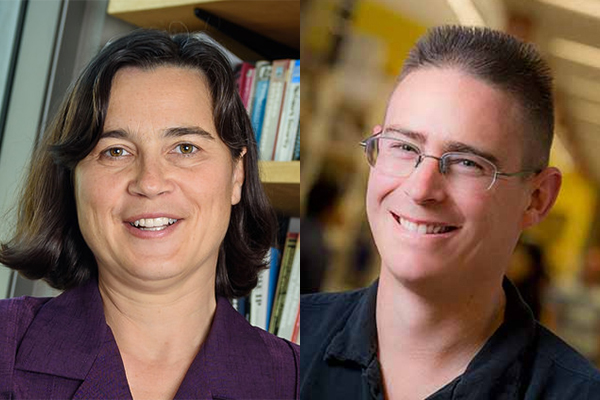
San Diego will be CSE professor Tajana Rosing
(left) and Pediatrics and CSE professor Rob Knight.
Four co-directors of the AIHL Center are drawn from both IBM Research and UC San Diego. At UC San Diego, the overall center will be led by CSE professor Tajana Rosing, holder of the Fratamico Endowed Chair in the Computer Science and Engineering department, and Rob Knight, a Pediatrics and CSE faculty member and Director of the UC San Diego Center for Microbiome Innovation. IBM researchers Ruoyi Zhou and Ho-Cheol Kim will co-direct AIHL activities at the company.
The projects on Healthy Aging and the Human Microbiome will be jointly led by faculty experts in the respective fields. The leaders of the Healthy Aging project are Virginia de Sa, a professor in Cognitive Science, and CSE professor Laurel Riek. The Human Microbiome theme will be led by three UC San Diego faculty members: CSE and Pediatrics professor Rob Knight, CSE professor Larry Smarr (who also directs the Qualcomm Institute's parent institute, the California Institute for Telecommunications and Information Technology, or Calit2), as well as Sandrine Miller-Montgomery, a Jacobs School of Engineering faculty member and executive director of the Center for Microbiome Innovation.

prolong the health and independance of
seniors.
As part of the IBM-UC San Diego partnership, IBM will also join the UC San Diego Center for Microbiome Innovation as a platinum sponsor.
The new collaboration is part of the IBM Cognitive Horizons Network, an international consortium of leading universities working with IBM to develop technologies needed to help fulfill the promise of artificial intelligence (AI). According to the National Institute on Aging, cognitive health-the ability to clearly think, learn and remember-is an important component of brain health.
"This is a very prestigious relationship for UC San Diego, the first university on the West Coast to collaborate with the IBM Cognitive Horizons Network," said Chancellor Pradeep K. Khosla. "Our campus, one of the top 15 research universities in the world, is home to changemakers whose innovation will help advance cognitive wellness to make a difference in our lives."
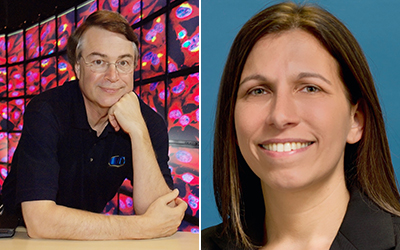
two major thrusts (l-r) Larry Smarr on the Human
Microbiome project, and Laurel Riek on the Healthy
Aging project.
The collaborative research initiative will use AI to comb through massive amounts of data to enable healthier living. Funds will be used to support faculty research; trainee stipends including opportunities for UC San Diego graduate and undergraduate students; administrative support; equipment; and corporate affiliation.
"We're committed to collaborating with the best minds in academia to inspire the next generation of scientists by providing access to leading-edge AI tools and expertise to solve real problems that impact human lives," said Dr. John Kelly III, IBM senior vice president, Cognitive Solutions and IBM Research. "This new collaboration with UC San Diego is the latest example of how we're executing on this AI vision -- and we are thrilled to bring our global AI research resources to Southern California to engage the wealth of local talent."
Read the complete news release on the CSE website.
Alan Turing Memorial Scholarship Celebrates Diversity in Computer Science
Sothyrak (Tee) Srey's voice fills with excitement when he recalls the day he learned he had been awarded the Alan Turing Memorial Scholarship.
"I woke up, saw the email, and couldn't believe it," he says. "I immediately called my mom. It was so exciting. I never thought I would be the one to earn such an award."
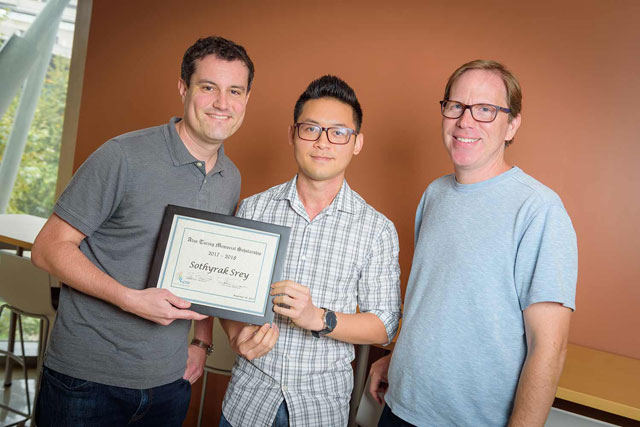
recipient Sothyrak Srey, and CNS director Stefan Savage
(Photos by Alex Matthews, Qualcomm Institute)
Originally from Cambodia, Srey enrolled at San Diego Mesa College before transferring to UC San Diego and the Computer Science and Engineering (CSE) department. He describes his first year on the La Jolla campus as equally difficult and amazing. He lost confidence when he no longer maintained the 4.0 GPA that he held in community college, but was elated to land his first internship. Balancing work and classes was stressful, but he met new friends and colleagues who motivated him. Best of all, Srey found a community where he was able to just be himself.
"In Cambodia, the LGBT community is not visible. I could not be 'out,'" he says. "When I got to UC San Diego, I wanted to be part of creating a safe and supportive community. I joined oSTEM, an organization for LBGTQ students in STEM, which has been a really positive experience. I want to show students that their sexual identity shouldn't prevent them from achieving their goals and being successful."
CNS established the Alan Turing Memorial Scholarship in 2015 to encourage a more diverse community in computer science education and research. The award honors the memory of Alan Turing, the mathematician and cryptanalyst who founded the field of computer science. During World War II, he devised the techniques that led to breaking codes produced by Germany's Enigma machine-a breakthrough credited with accelerating the Allied victory by more than a year. After the war, he was persecuted for being gay. He died by his own hand in 1954.
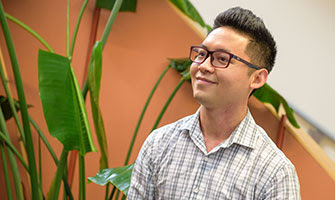
is only the second recipient of the Alan Turing
Memorial Scholarship established by CNS.
"Alan Turing is a giant in the pantheon of computer science pioneers and his story is both tragic and inspirational," said computer science professor George Porter, associate director of CNS. "Our center wants to engage, support and recognize diverse communities in line with UC San Diego's strategic plan, and naming the scholarship after Turing affirms our belief in the importance and future contributions that LGBT-supportive students will make to computer science and engineering."
Srey is the second student to receive the scholarship. Last year, Valeria Gonzalez became the inaugural recipient. A third year transfer student majoring in computer engineering, Gonzalez says the award provided much more than financial support.
"It was really impactful to receive an award that recognizes the presence of LGBTQ folks in STEM communities," Gonzalez said. "Computer science draws people from all different backgrounds, and I think it's so important to demonstrate inclusivity and be supportive of students, especially those whose identities are often challenged and invalidated. Having people with different backgrounds, talents and perspectives will only make our field stronger and provide folks an environment where they can reach their full potential."
Srey echoes this sentiment, and adds that the scholarship has given him greater confidence to pursue his goals. Ultimately, he wants to return to Cambodia and start a nonprofit that teaches underprivileged children to code. He also hopes to empower the LGBT community in Cambodia, building a safe space for LGBT youth.
"It's an honor to be recognized with an award named for Alan Turing. He had such a big impact on computer science and we can only imagine what more he would have contributed to the field had he not been persecuted for his identity," said Srey. "The scholarship has motivated me to work even harder. I believe I can use my knowledge to really make an impact."
The Alan Turing Memorial Scholarship is open to undergraduates majoring in computer science or computer engineering who are active supporters of the LGBT community. The scholarship is awarded to students based on academic merit, with preference for students with demonstrated financial need.
CNS, an interdisciplinary computer science research center at UC San Diego, established the scholarship with gifts from the center's annual giving fund. The center is now looking for additional philanthropic support to create an endowment, which would enable the scholarship to be awarded in perpetuity.
For more information about supporting the Alan Turing Memorial Scholarship, call 858-534-8305 or email jduca@ucsd.edu; donations can also be made online .
All gifts contribute to the Campaign for UC San Diego.
Human-Centered Computational Tools Theme for Weekly Design@Large Lecture Series
This week the Design Lab at UC San Diego will launch the latest edition of its Design@Large lecture series. For the Fall 2017 quarter, the series is organized by computer scientist and Cognitive Science professor Philip Guo, with all talks to take place in the CSE auditorium (Room 1202) every Wednesday afternoon at 4:00pm. The overall theme for the quarter is "Human-Centered Computational Tools."
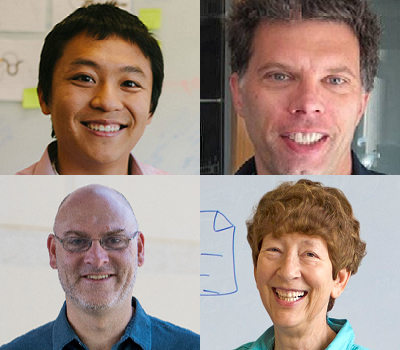
series include (clockwise from top left) Haoqi Zhang,
Thomas Ball, Margaret Burnett and Brian Granger.
The first D@L lecture, on Oct. 4, will feature Northwestern University computer science professor Haoqi Zhang. His lecture will focus on "Computational Ecosystems: Tech-Enabled Communities to Advance Human Values at Scale." For an abstract of Zhang's talk and his bio, see the Upcoming Events section at the bottom of this email.
Upcoming topics in the Design@Large lecture series include:
October 11: Physical Computing for Everyone, with Microsoft Research principal researchers and manager Thomas Ball;
October 18: Gender-Inclusive Software, with Distinguished Professor Margaret Burnett from Oregon State University;
October 25: Project Jupyter: Design Considerations for Interactive Computing, with Brian Granger, and associate professor of Physics and Data Science at Cal State San Luis Obispo.
To keep up with the rest of the Design@Large lecture series, be sure to bookmark the D@L web page. In November, speakers on the schedule will include CSE faculty members Leo Porter and Sorin Lerner, the Qualcomm Institute's Hari Garudadri, and Cecilia Aragon from the University of Washington. All talks in the series are free and open to the public.
Deadlines Approach for CSE Alumni Reception and SD Hacks 2017
Under the theme "Build Your Dreams," student organizers are getting ready to host the 2017 SD Hacks hackathon beginning on October 20th. The deadline for UCSD students to register for the event is October 8. (The deadline for applications from non-UC San Diego students, Oct. 1, has now come and gone.)
Date: Friday, October 20-Sunday, October 22, 2017
Time: 7pm Friday (hacker registration) to 1pm Sunday (closing ceremony)
Location: RIMAC Arena
This is the third annual edition of UC San Diego's 36-hour, 1,000-student hackathon. SD Hacks 2017 offers workshops to introduce hackers to DragonBoard, Virtual Reality (VR), 3D printing, iOS app development, and more. The hackathon will also have on hand hardware, food, Internet access, swag and job opportunities. Additional resources for VR and hardware hackers will include VR equipment such as Oculus Rifts, HTC Vives etc., 3D printers in the maker space to build 'hardware hacks', and a large selection of development resources (including APIs offered by sponsors). Experienced mentors are also part of SD Hacks 2017, including CSE alumni and experienced developers to help teams make their apps shine..Be prepared to learn a lot, make new friends, and have an incredible weekend! On Saturday, there will also be tech talks by some of the hackathon's sponsor Institutions. The final demos for each team are scheduled to start at 11am on Sunday, Oct. 22.
In addition to hackers and sponsors, SD Hacks 2017 is looking for volunteers who can help with logistics at the event. Anyone interested in attending the event as a volunteer? Visit https://tesc.typeform.
And remember: the department will be hosting a CSE Alumni Reception on the first day of SD Hacks 2017...
.jpg)
All alumni are invited to attend the CSE Alumni Reception in connection with the hackathon. Alumni are also encouraged to volunteer at the web link above. Appetizers, desserts and beverages will be served. Casual business attire is suggested. This exclusive event is open to CSE alumni only and there is no charge to attend.
Space is limited, so RSVP online for the CSE Alumni Reception no later than Friday, Oct. 6at: https://goo.gl/forms/
UPCOMING EVENTS
|
WEDNESDAY, OCTOBER 4, 2017 |
CSE Summer Internship Symposium Poster Session
.jpg)
|
WEDNESDAY, OCTOBER 4, 2017 |
.png)
Computer Science and Engineering Society Invites Students to First Meeting of Fall Quarter
The Computer Science and Engineering Society (CSES) is having its first meeting this Wednesday in week 1 of the Fall 2017 quareter. Students are invited to become part of the ever-growing Computer Science community on campus -- not just CSE students! All majors are welcome. The Society will be going over its 10+ events for the quarter, CSES's Mentor/Mentee program, how you can get involved, and much more.
Chipotle will be served after the presentation.
Date: Wednesday, October 4
Time: 7:00pm
Location: Price Center West, Ballrooms AB
Please RSVP to CSES's Facebook event:
https://www.facebook.com/
|
WEDNESDAY, OCTOBER 4, 2017 |
Design Automation of Cyber-Physical Systems: System-Level Approaches for Energy-Aware Electric Vehicle Design and Management
The CSE Distinguished Lecture Series for the Fall 2017 quarter continues with this talk by researcher Naehyuck Chang of the Korea Advanced Institute of Science and Technology (KAIST).
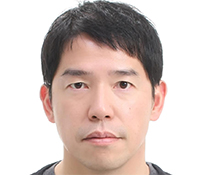
Date: Wednesday, October 4, 2017
Time: 11:00 a.m.
Location: Room 1202, CSE Building
Abstract: Why do we drive electric vehicles? It is not easy to say that electric vehicles are higher performance compared with similar price range of internal combustion engine vehicles. There are financial benefits including Government subsidies and tax deduction, which cannot be sustainable. A low maintenance cost is a good advantage, but vehicle depreciation is a big question. Therefore, environmental friendliness should be one clear motivation to drive electric vehicles.
However, electric vehicles are only "zero exhaust emission" because of tire and brake emissions, which occupy a large portion of the total vehicle emissions. Even putting aside the tire and brake emissions, electric vehicles still contribute to significant amount of pollution because of the source of electricity. Electric vehicles produce less than a half of equivalent exhaust emissions compared with gasoline vehicles and not much different from that of hybrid vehicles. Higher MPGe (mile per gallon gasoline equivalent) of electric vehicles can largely mislead the energy efficiency when it comes to "well to wheel" efficiency taking the entire energy ecosystem into account.
It is challenging to make electric vehicles more fuel-efficient because the key powertrain components are already highly efficient, and therefore, there is a very narrow headroom for further enhancement. Consequently, the challenges for extended range of electric vehicles end up with deployment of more lighter materials, which directly impacts on the manufacturing and repair costs, and it may make actual cost of ownership very high. Extended driving range of electric vehicles is one of the most demanding requirements of the current and potential electric vehicle owners, but use of a larger-capacity battery pack makes the vehicle curb weight heavier and thus the fuel efficiency worse.
In this talk, we introduce system-level solutions to enhance electric vehicle fuel efficiency with the current powertrain technologies. First, we develop an instantaneous power consumption modeling of electric vehicles by the curb weights, speed, acceleration, road slope, passenger and cargo weights, motor capacity, and so on, as a battery discharge model. We ensure the model fidelity as we fabricate a lightweight custom electric vehicle perform extensive measurement. The model fidelity enables us to achieve a more accurate range estimation.
We attempt both design and runtime energy optimization using the electric-vehicle-specific energy characteristics. We emphasize that electric vehicles show completely different fuel consumption behaviors from internal combustion engine vehicles due to the significant discrepancy in the drivetrain. We introduce minimum-energy driving methods for electric vehicles, which are largely different from eco-driving methods of internal combustion engine vehicles. We also propose a rapid energy-aware electric vehicle synthesis that allows users to quickly customize their own electric vehicle powertrain specification without understanding the technology.
Finally, we also give a heads up of an application-specific (extreme off-road driving) electric vehicle design challenges. We proved electric vehicles are capable, efficient and promising on extreme off-roads through real trail run tests.
Bio: Naehyuck Chang is a Full Professor at the Department of Electrical Engineering, Korea Advanced Institute of Science and Technology (KAIST) from 2014. Before he joined KAIST, he was with the Department of Computer Science and Engineering, Seoul National University from 1997 to 2014. Dr. Chang also served as a Vice Dean of College of Engineering, Seoul National University from 2011 to 2013. His current research interests include low-power embedded systems and Design Automation of Things such as systematic design and optimization of Cyberphysical Systems. Dr. Chang is an ACM Fellow and an IEEE Fellow for contribution to low-power systems. The speaker is the winner of the 2014 ISLPED Best Paper Award, 2011 SAE Vincent Bendix Automotive Electronics Engineering Award, 2011 Sinyang Academic Award, 2009 IEEE SSCS International SoC Design Conference Seoul Chapter Award, and several ISLPED Low-Power Design Contest Awards in 2002, 2003, 2004, 2007, 2012, 2014, and 2017. Dr. Chang and his colleague introduced the world's first extreme off-road electric Jeep Wrangler and recently finished the Rubicon Trail run for the first time in the history by an electric Jeep Wrangler with just a single recharging at the Rubicon Springs Basecamp.
|
MONDAY, OCTOBER 9, 2017 |
Power Lunch for the Cyber Security Crowd
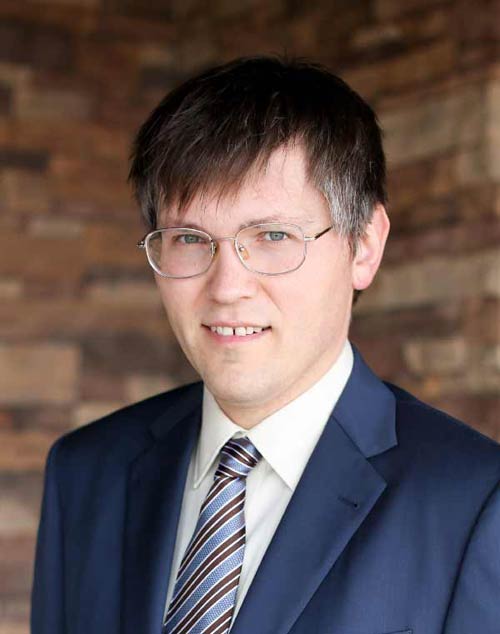
Security Lunch, a weekly computer security seminar, will resume this quarter, according to organizer and CSE research scientist and alumnus Kirill Levchenko. The first meeting took place on Monday, October 2, and the next regular meeting will be:
Date: Monday, October 9
Time: 12 noon
Location: Room 3109, CSE Building.
Everyone interested in computer security is welcome to attend. You may also want to sign up for the security mailing list: cse-security@eng.ucsd.
On Monday, attendees began choosing speakers for the rest of the quarter, plus discussing recent stories in security news. Come ready to talk about recent news stories!
|
MONDAY, OCTOBER 9, 2017 |
Automated Reasoning for Software/Systems Quality and Security
This seminar is part of the CSE Distinguished Lecture Series, and it will feature three young CSE faculty: Nadia Polikarpova, Sicun (Sean) Gao, and Deian Stefan. Each of the three CSE faculty members will speak for about 20 minutes on their respective topics below.
Date: Monday, October 9, 2017
Time: 11:00 a.m.
Location: Room 1202, CSE Building
1. Nadia Polikarpova: Type-Driven Program Synthesis
Modern programming languages safeguard developers from many typical errors, yet more subtle errors still plague software. Program synthesis has the potential to eliminate such errors, by generating executable code from concise and intuitive high-level specifications. This talk will present Synquid, a program synthesizer that accepts specifications in the form of expressive types and uses a specialized type checker to validate large sets of candidate programs at once, whereby efficiently pruning the search space. Synquid is the first synthesizer powerful enough to automatically discover provably correct implementations of complex data structure manipulations, such as insertion into Red-Black Trees and AVL Trees, and normal-form transformations on propositional formulas. Each of these programs is synthesized in under a minute.
2. Sicun (Sean) Gao: Automated Reasoning for Physical Computing
Automated reasoning is an area of AI that studies algorithmic approaches to logical reasoning and (NP-hard) problem solving in general. My research focuses on automated reasoning for cyber-physical systems (e.g. autonomous cars) that exhibit complex behaviors because of their tight integration of discrete and continuous components. I will describe how an automated reasoning framework can tackle the core computational challenges in this domain, by unifying a variety of algorithms from combinatorial search, numerical optimization, and statistical learning.
3. Deian Stefan: Physis: A Secure Runtime System for Physically-Coupled DevicesBuilding IoT applications that are secure and preserve data privacy is notoriously difficult. Though the popular media and some researchers have been quick to attribute fault to IoT developers, this fault placement is misguided. IoT developers are tasked with the heroic task of building secure applications that not only interact with the physical world, but are distributed and run on heterogeneous devices. Unfortunately, existing programming models do not make most these concerns explicit and force developers to devise ad-hoc mechanisms to, for example, deal with data privacy. Unsurprisingly, this has led to scenarios where sensitive sensor data have been leaked and devices have been exploited to participate in distributed denial-of-service (DDOS) attacks.
In this talk, I will describe a language-based approach to building secure and privacy-preserving application. In particular, I will describe our new efforts to develop a language runtime system, called Physis, that will enforce security and data privacy for IoT applications. At the heart of Physis is a novel information flow control monitor that tracks and restricts the flow of information at abstraction boundaries (e.g., physical-software boundary and the network-application boundary) and a physically-coupled contract system that allows developers to specify high-level security and privacy policies. Together, these mechanisms will allow developers to build application that are uniformly resilient to physical and cyber attacks, while still capable of performing necessary (and privacy-aware) operations, such as sensing, actuation, and network communication.
ALUMNI SURVEY
Take the CSE Alumni Survey. It only takes a few minutes. We'd really like to hear from you!
GIVING OPPORTUNITIES
The Jacobs School of Engineering offers a variety of ways to support the Department of Computer Science and Engineering. As the 2016-'17 academic year gets underway, please consider giving online to the CSE Engineering Tutor Program or the Paul R. Kube Chair of Computer Science. You can also honor your favorite teacher when you donate to the CSE Teaching Endowment Fund.
Keep us posted on your travel and other research plans, what you're doing, where and when, this fall. We want to know! Email Doug Ramsey at dramsey@ucsd.edu.

